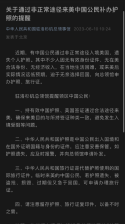You are using an out of date browser. It may not display this or other websites correctly.
You should upgrade or use an alternative browser.
You should upgrade or use an alternative browser.
China News Thread
- Thread starter KYli
- Start date
They paid $7 million appearance fees for Argentina. Was that paid in US$ or RMB?
Westernized diet causing public health concerns:
With rapid economic development and urbanization, dietary patterns in China have become more Westernized, with increased consumption of refined grains and meat. This is fast becoming a concern as many of the nation’s citizens get wealthier, fatter and more susceptible to ‘rich world’ health problems. In cities and rural areas, “there are new kinds of food, which are not very healthy. But they are convenient, and they often taste better.”
In 1982, fat from food contributed to 12% of the average total energy intake of a Chinese adult, according to a national nutrition survey conducted by the Chinese Center for Disease Control and Prevention. By 2015, that proportion had grown to 35% per person — roughly a percentage point behind the average US figure. Dietary fat intake is associated with multiple chronic diseases, including obesity, heart disease and cancer. As a result, the World Health Organization and many governments recommend that energy from dietary fat should not exceed 30% of an individual’s daily intake.
by China’s National Health Commission, more than 50% of Chinese adults and nearly 20% of school-age children are overweight or obese. Heart disease is the leading cause of death in China, killing about four million people each year.
Research shows that reducing the Chinese population’s salt intake by a single gram each day could prevent almost nine million deaths from cardiovascular disease by 2030.
Within the Chinese population are multitudes of genetic differences, which . For example, the metric of body mass index (BMI) is widely used worldwide to measure whether a person is underweight, healthy, overweight or obese. But research has found that Chinese people are more susceptible to the effects of obesity on blood pressure and other risk factors for cardiovascular disease than are people of other ethnicities. People in China are also more likely to develop metabolic disorders, such as diabetes, for each unit increase in BMI.
Policy approaches
Facing the rapid increase in diet-related chronic diseases, the Chinese government has launched several strategic plans and policies in a bid to slow the trend. In Healthy China 2030, published in 2016, and the National Nutrition Plan, released in 2017, the central government pledged to cut Chinese residents’ salt intake by 20% by 2030, and “significantly slow the overweight and obesity growth rates”.
“The central government is paying unprecedented attention to residents’ health,” says Lijing Yan, a global-health researcher at Duke Kunshan University near Suzhou, China.
The government’s approach has been to focus on food security before worrying about good nutrition, says Jikun Huang, director of the Center for Chinese Agricultural Policy at Peking University in Beijing. “It’s transformed gradually from grain economy and security. But I believe in the next ten years there will be more interest in public and government policy for health and nutrition.”
Let's get China's average life expectancy to 100 by 2049! (I'm just kidding)
But there's a lot of work that can be done to still increase people's health in China and around the world. This is great.











